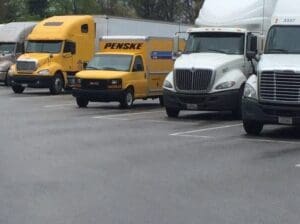Do You Need a CDL to Drive a Box Truck?
One of the most important questions when driving a box truck is whether you need a Commercial Driver’s License (CDL). This 
Understanding these rules is important, as they affect everything from legal compliance to insurance coverage and liability in the event of an accident. Whether you’re using a box truck for local deliveries or long-distance hauls, different classifications apply, and failing to adhere to these requirements may result in serious consequences.
Key differences in box truck operations include licensing requirements, vehicle classifications, and the consequences of driving without the proper CDL. Operating a box truck without the correct credentials can result in serious penalties and liabilities.
Commercial Driver’s License Requirements for Box Trucks
Driving a box truck requires a specific set of skills and qualifications, which are governed by CDL requirements. Box trucks typically fall under CDL Class B, which is required for vehicles weighing over 26,000 pounds, but the exact class may depend on the size and weight of the truck.
There are three main CDL classifications:
- Class A: Required for combination vehicles, such as tractor-trailers.
- Class B: For single vehicles with a gross vehicle weight rating (GVWR) of over 26,000 pounds, like box trucks.
- Class C: For smaller vehicles that don’t meet Class A or B criteria but still require a CDL, such as vehicles transporting hazardous materials.
Endorsements may be necessary depending on the specific cargo or vehicle type. For example, a Hazmat endorsement is required to transport hazardous materials, and an Air Brakes endorsement is needed for vehicles equipped with air brakes. The testing and certification process involves both written exams and road skills tests to demonstrate proficiency. Once certified, a CDL must be renewed periodically, with requirements varying by state.
If you’ve been injured in a truck accident, let our experienced box truck accident attorneys review your case to ensure your rights are protected, and you receive the compensation you deserve.
Box Truck Weight Classifications and Vehicle Specifications
Box trucks come in various sizes and weight classifications, designed for different commercial uses. These vehicles are commonly used for deliveries, moving services, and transporting goods. The size and weight of the box truck determine the type of CDL required to operate it.
The Gross Vehicle Weight Rating (GVWR) is a crucial specification, representing the maximum allowable weight of the truck, including its cargo and passengers. Box trucks typically range from 10,000 to 26,000 pounds in GVWR, with smaller trucks falling under Class 3 or Class 4 — and larger models classified as Class 5 to Class 7.
In many states, box truck drivers do not need a CDL for box trucks with a GVWR under 26,001 pounds. However, if the truck exceeds this limit, a Class B CDL is required to operate the vehicle legally. Maximum dimensions also play a role in box truck classification. The standard maximum length is 40 feet, and the width is generally 8.5 feet, though these dimensions may vary based on local state laws.
State-by-state weight limits and regulations can differ, especially when traveling on highways, bridges, or through commercial zones. These variations in weight restrictions can be complicated, and violations may result in heavy fines, penalties, or even legal consequences for both the truck driver and the company. It’s essential to understand how these regulations apply to your specific situation to avoid costly errors.
If weight violations played a role in your truck accident or you’re unsure about how these laws might impact your case, contact our experienced truck accident lawyers today. Let us review the details of your case to provide you with a comprehensive understanding of your options and potential compensation. Don’t face the legal process alone — reach out to us for a free consultation today.
Box Truck Operations Without a CDL

Even when a CDL isn’t required, safety should always be a priority. In addition to the Class D license, some jurisdictions may require specific permits for operating box trucks, particularly for vehicles carrying hazardous materials or for vehicles traveling on certain roads, like highways or restricted zones.
A specialty permit or a non-CDL license endorsement might be necessary, depending on the nature of the load, the routes being taken, or the cargo being transported.
Common Box Truck Accidents and Legal Implications
Box trucks are involved in several common types of accidents that often result in serious damage and injuries. These accidents can cause significant harm and financial repercussions for those involved. Some of the most common types of box truck accidents include:
- Rear-end collisions: Often caused by the truck’s inability to stop quickly due to heavy loads, poor braking performance, or driver inattention.
- Jackknife accidents: These accidents occur when the truck’s trailer swings out of control, often due to improper loading or driver error, especially on slippery or wet roads.
- Rollovers: When the box truck tips over, usually due to high speeds, sharp turns, or improperly distributed cargo, it may roll over once or several times.
- Blind-spot accidents: These accidents are common when drivers fail to see smaller vehicles, pedestrians, or cyclists, particularly when turning or changing lanes.
Determining Liability
In all of these cases, understanding who is at fault is critical to determining liability and pursuing compensation. If you’ve been involved in a box truck accident, schedule a free consultation to discuss your legal options with our experienced team. We’ll help you understand your rights and guide you through the legal process on the path to a favorable outcome.
Differences Between Personal and Commercial Box Truck Use
The primary difference between personal and commercial box truck use lies in how the vehicle is classified and the associated regulations. They include:
- Business vs. personal vehicle classifications: Commercial box trucks are classified as vehicles used for business operations, while personal trucks are not. Commercial trucks are subject to stricter safety, insurance, and registration rules.
- Interstate vs. intrastate regulations: Commercial trucks that travel across state lines (interstate) are subject to federal regulations set by the Federal Motor Carrier Safety Administration (FMCSA). In contrast, intrastate vehicles, which operate only within a single state, follow state-specific rules but may still require compliance with similar safety standards.
- License requirements: A commercial box truck requires a Commercial Driver’s License (CDL) depending on its weight, use, and whether hazardous materials are being transported. Personal box trucks under certain weight limits may not require a CDL.
The way a box truck is used may result in significant consequences for liability, insurance, and your case. Contact our truck accident lawyers to understand how vehicle usage affects your case and your legal options.
Penalties for Operating a Box Truck Without Proper Licensing
Operating a box truck without the proper licensing can result in serious legal and financial consequences, both for the driver and the employer. Federal and state regulations require commercial drivers to hold a valid CDL if their vehicle meets certain weight or usage thresholds. Failure to comply with these requirements can lead to significant penalties, including the following.
- Federal and state fines: The driver may face fines for operating a commercial vehicle without a valid CDL. These fines can vary depending on the severity of the violation and whether the driver was operating the vehicle across state lines or within a state.
- Impact on insurance coverage: Operating a box truck without proper licensing can lead to issues with the vehicle’s insurance coverage. Insurance providers may refuse to cover damages resulting from an accident, leaving the driver or employer responsible for all costs.
- Employer liability: Employers who allow unlicensed drivers to operate box trucks may face significant liability, including fines, increased insurance premiums, and potential legal claims if an accident occurs.
If you were injured in an accident with a box truck driver without the necessary CDL, speak with our experienced attorneys. We’ll review your case, explain your rights, and work to develop a strategy to protect your interests.
Don’t risk further legal complications — contact us today to schedule a free consultation.

Marion Munley
Marion Munley has been practicing personal injury law for nearly 40 years. She is triple board-certified by the National Board of Trial Advocacy for Truck Accident Law, Civil Trial Law, and Civil Practice Advocacy. She currently serves as Vice President of the American Association for Justice, an organization dedicated to safeguarding victims’ rights. Marion has won many multimillion-dollar recoveries for her clients, including one of the largest trucking accident settlements in history. She has been named a Top 10 Super Lawyer in Pennsylvania since 2023, a Best Lawyer in America, and was recently inducted to the Lawdragon Hall of Fame.
Posted in Truck Accidents.









